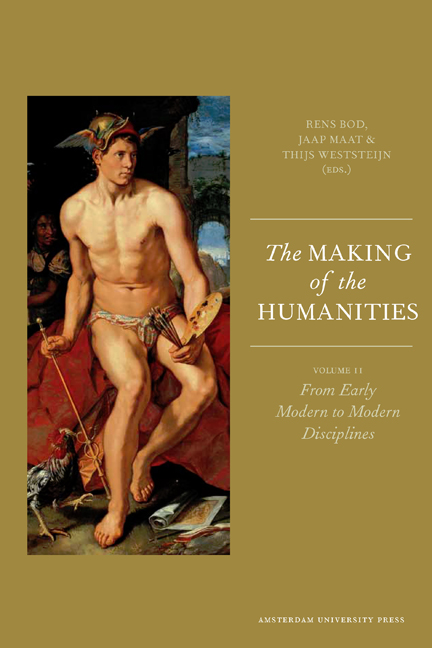Book contents
- Frontmatter
- Contents
- Introduction: The Dawn of the Modern Humanities
- I Linguistics and Philology
- II The Humanities and the Sciences
- III Writing History and Intellectual History
- IV The Impact of the East
- V Artworks and Texts
- VI Literature and Rhetoric
- VII Academic Communities
- Contributors
- List of Figures
- Index
The Oriental Origins of Orientalism: The Case of Dimitrie Cantemir
Published online by Cambridge University Press: 19 January 2021
- Frontmatter
- Contents
- Introduction: The Dawn of the Modern Humanities
- I Linguistics and Philology
- II The Humanities and the Sciences
- III Writing History and Intellectual History
- IV The Impact of the East
- V Artworks and Texts
- VI Literature and Rhetoric
- VII Academic Communities
- Contributors
- List of Figures
- Index
Summary
He was as good a sovereign of the sort
As any mention’d in the histories
Of Cantemir, or Knolles, where few shine
Save Solyman, the glory of their line.
Lord Byron, Don Juan, V: 147Introduction: Post-orientalism and beyond
Edward Said's Orientalism continues to set the tone for debates about the political roles and implications of the academic study of the Islamic, and more generally the non-Western, world in the Western humanities, even though its shortcomings have long been known. Specifically, and influentially, Said argues that there is a direct link between knowledge of the Orient and colonial domination; he mostly bases his case on detailed discussion of orientalist scholarship on the Arab-speaking regions of the Ottoman empire in France and England in the nineteenth century, and in the United States in the twentieth. Much can be said about this argument; but for the present discussion, three kinds of problems are most directly relevant.
First, as was already noted at an early stage, Said's argument has a very restricted geographical basis, as he does not take German and Russian orientalism into account; indeed, some have presented the German case as a refutation of his main thesis. Although German orientalism had a dominant position for much of the nineteenth century, German colonial projects would not materialize until well after the 1870 unification under Bismarck. The Russian case is even more complex: from the sixteenth century onward, the Russian empire incorporated Muslim subject populations that were not necessarily, or unambiguously, seen as radically different from the recently converted Russian peasantry, or from other subject nations; it was not until the later eighteenth century that a more selfconscious expansion into the Caucasus and Central Asia and a concomitant form of orientalist knowledge developed. In many ways, the Soviet Union reproduced ‘bourgeois’ orientalist knowledge that had been produced in, particularly, imperial Russia and Germany; but it cannot simply be said to be an empire or colonial enterprise in any but the widest sense. Likewise, scholars in the Ottoman empire and its successor states also developed something like an orientalist tradition of their own.
- Type
- Chapter
- Information
- The Making of the HumanitiesVolume II: From Early Modern to Modern Disciplines, pp. 243 - 264Publisher: Amsterdam University PressPrint publication year: 2012



